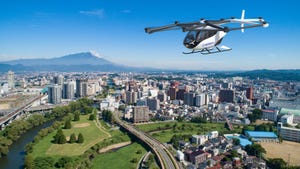Beijing Introduces New Rules as China Pushes Self-Driving TechBeijing Introduces New Rules as China Pushes Self-Driving Tech
Meanwhile, four districts in the south of the country sign agreement to allow self-driving taxis to travel across different cities
.jpeg?width=1280&auto=webp&quality=95&format=jpg&disable=upscale)
The Chinese capital Beijing has announced new regulations that will take effect later this year designed to accelerate the rollout of autonomous vehicles (AVs).
The regulations were approved by the Standing Committee of Beijing Municipal People’s Congress and have been specifically created to encourage continued investment, development and innovation among automakers.
Among the areas covered are the planning and building of infrastructure and management of traffic, plus measures to ensure that AVs are safe to operate and are inspected and maintained regularly.
The city has already amassed a wealth of experience in automated transportation thanks to the establishment of the High-Level Automated Demonstration Area (BJHAD) in the Yizhuang economic development zone, which has established itself as one of the foremost hubs for AV testing in China.
Insights learned from this program – which has seen self-driving taxis from the likes of Baidu and Pony.ai, among other vehicles, take to the streets – are now being used to further evolve strategy and policy.
Also included in the latest regulations are clearly defined legal responsibilities for operators, such as a requirement to perform annual inspections under a new system set to be introduced.
Transgressions including testing without the correct permits and failure to provide [human] safety monitors on AVs that require them, will be punishable by fines.
Local media have reported that initial feedback from operators and automakers has been positive, and the new laws are likely to have the desired effect in ensuring continued – and in some cases increased – investment.
The regulations follow the dramatic expansion of BJHAD since its launch in 2020. More than 30 different companies have now been approved to test there, with nearly 900 vehicles accruing a total autonomous test mileage of just under 20 million miles.
Meanwhile, in a further sign that China is moving further ahead in the rollout of autonomous driving tech, it has been announced that four districts in the south of the country have signed an agreement that will allow self-driving taxis to travel across different cities.
The Nansha district of Guangzhou, the Qianhai and Bao’an districts in Shenzhen and Hengqin – an island that is co-administered by Zhuhai and Macau – have signed up to the program, which in effect allows regulatory approval in one area to be recognized in the others.
Among the aims is to provide better connections for the Greater Bay Area, which encompasses Guangdong province, Hong Kong and Macau. Four companies running AVs are involved in the pilot at the outset; Pony.ai, Baidu’s Apollo Go ride-hailing platform, Chenqi Technology and Cowa Robot.
Read more about:
AsiaAbout the Author
You May Also Like








